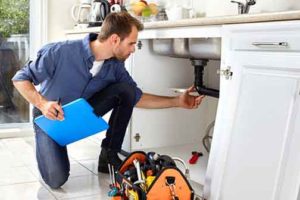
Some plumbing problems in your home are easy to solve because the root cause of the issue and the right solutions are very clear. For instance, if a faucet is dripping or your toilet is running, a simple YouTube search will tell you how to fix the problem.
But not all plumbing problems in your home are like that, says EPM Elite Properties. Some plumbing issues come with complex symptoms that leave you confused about the real cause of the problem. For instance, low water pressure in your home may be due to three different but unrelated causes.
There are also plumbing problems that appear straightforward at first but turn out to be complicated in the end. For example, a clogged toilet may result from a collapsed section of the sewer line instead of being the result of someone flushing something down your toilet drain.
Complex plumbing problems in your home ultimately lead to worse issues like structural problems. Examples of these kinds of problems include mineral deposits in water lines, persistent drain issues, silent leaks within walls/flooring, and many more.
Because they don’t come with clear signs, these problems force you to waste time and money. How do you deal with complex plumbing issues in your home? When you don’t know what is wrong with your plumbing, one of our professional plumbers can help you.
How Chicago Plumbing Experts detect and fix complex plumbing issues in your home
When our plumber first arrives at your home, they may not know the exact cause of the plumbing problems. Even if they can make an educated guess based on experience and the information you give them, they still have to take definite steps to diagnose the problem.
Depending on the kind of problem, these steps will include at least one of the following:
- Conversation with the homeowner
Just like when you visit a doctor, your plumber wants to get as much info as possible about the problem. When did you first notice the issue? How long has it been going on? What steps have you taken to solve it? Detailed firsthand information helps our plumber narrow down the list of the potential causes of the problem.
- Visual inspection
This doesn’t involve the use of specialized tools. The plumber wants to get their eyes on your plumbing system. They will conduct a superficial – surface level – inspection of drains, toilets, sinks, exposed pipes, and other accessible parts of the plumbing. This step helps our plumbers make better sense of what you have told them, and they can get clues on where to focus attention.
For a more in-depth look at the plumbing, our plumber will use some of the tools described below:
- Infrared detection: Infrared cameras detect temperature differences beneath hard surfaces. Because the camera can sense the unique heat signature of moisture, it is used to detect hidden leaks within walls and flooring. In addition to leaks, it can pick up the thermal patterns that indicate some other kind of plumbing issue. Infrared technology allows for non-invasive leak detection. So you don’t have to break your wall to inspect your pipes.
- Sewer camera inspection: This specialized camera is used to inspect the interior of sewer pipes and underground drainage pipes. The waterproof camera is inserted into the blocked or damaged pipe, and it sends back a high-resolution video of the inside of the pipe as it travels through the line. The plumber can then scrutinize the image to detect the problems in the line.
- Moisture meters and moisture sensors: Moisture detection equipment either shows a numerical readout or emits an audible beep to indicate elevated moisture levels in drywall, insulation, carpet, subflooring, wood, concrete, etc. Non-penetrating meters are used where the surface cannot be damaged. There is a wide range of moisture detection devices for different types of surfaces and plumbing problems.
- Gas leak detectors: These are used to detect the presence of flammable gases – methane, propane, and butane – in the air. They are used in homes with gas water heaters, where there is a chance that the gas line is leaking or the system is not venting properly. Gas leaks can be life-threatening if they happen in an enclosed space. Sometimes, the presence of gas is undetectable except with a gas leak detector.
- Water analysis: This helps to detect water quality issues in your home; it can reveal the presence of soil and minerals in your water. If your water is discolored, water analysis helps the plumber determine if it is due to rust or because soil is making its way into the pipe through a leak. Water analysis is also used to uncover the root causes of low water pressure in homes.
To conclude, most homeowners can recognize problems that affect their home’s water supply or the function of their plumbing. However, just because they can recognize these problems does not mean they understand them.
Many times, when homeowners think they are solving a plumbing issue in their home, they are only addressing the symptoms. Our professional plumbers can diagnose and solve plumbing issues in your home, helping to stop the problem from escalating.
